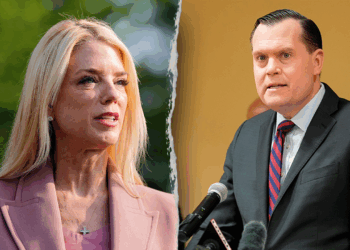The U.S. wants to bolster its relations in the Indo-Pacific to guard against China, but it will have to navigate an environment that’s been stunned by the economic blows dealt by President Donald Trump’s protectionist trade policies.
Secretary of State Marco Rubio is on his first official trip to Asia this week to attend the annual Association of Southeast Asian Nations (ASEAN) regional security conference in Kuala Lumpur, Malaysia. The State Department said Rubio will focus on “reaffirming the United States’ commitment to advancing a free, open, and secure Indo-Pacific region,” rather than on tariffs or trade. The conference, though, will be attended by officials from a number of the countries targeted by new tariff rates set to go into effect next month.
Earlier this week, Trump announced 25% tariffs on two key partners, Japan and South Korea—which are not members of ASEAN but do have delegations attending the conference—after negotiations failed to materialize deals. On Wednesday, Trump also unveiled an increased to 20% tariff on the Philippines, an ASEAN member and longstanding U.S. treaty ally. He also shared new tariff rates on ASEAN members Brunei, Cambodia, Indonesia, Laos, Malaysia, Myanmar and Thailand, effective Aug. 1. Meanwhile, Vietnam—one of three countries worldwide to cut a deal with Trump—will be tariffed at a 20% rate.
Read More: Trump’s Trade Deals, Negotiations, and New Tariffs for Each Country
Tariffs have already been at the center of ASEAN talks, which began Tuesday.
“This meeting takes place amid the unravelling of assumptions, where power unsettles principle, and calm can no longer be taken for granted. The global order is fraying,” Malaysian Prime Minister Anwar Ibrahim said in his opening remarks on Wednesday. “Tools once used to generate growth are now wielded to pressure, isolate and contain.”
“Tariffs, export restrictions and investment barriers have now become the sharpened instruments of geopolitical rivalry,” he said. Calling on ASEAN countries to strengthen trade with each other, he added: “This is no passing storm.”
Anwar told reporters after his opening speech that Malaysian officials were “in the midst of negotiations” with the U.S. and that he plans to “raise some of these issues for his consideration” when he meets Rubio Thursday.
U.S. seeking stronger security ties in Southeast Asia
U.S. officials have sought to reaffirm security commitments to Southeast Asia, even as the U.S. under Trump has withdrawn from and rolled out apparent punitive measures towards many countries in the region.
In January, Rubio “underscored the United States’ ironclad commitments to the Philippines” under the countries’ Mutual Defense Treaty in a call about China’s “dangerous and stabilizing” actions in the South China Sea. That same month, he also spoke with Vietnam’s Deputy Prime Minister and Foreign Minister Bui Thanh Son about China’s “aggressive behavior” in the disputed sea. The U.S. held joint maritime drills with the Philippines earlier this year as usual and signalled further commitment with the presence of USS George Washington in the South China Sea last week. Earlier this month, Rubio met with “the Quad”—officials from Australia, India, and Japan—in an attempt to shift U.S. attention towards the Asia-Pacific after Trump’s military intervention in the Middle East.
A senior State Department official told the AFP that these sorts of affirmations are “in America’s interest.”
But Trump himself has put U.S. commitments to international partners in doubt, including rolling back U.S. involvement in the Asia-Pacific region. The shuttering of USAID put at risk the lives of millions of people in dozens of low- and middle-income countries, including several in Southeast Asia. USAID emergency responders in Myanmar were told to go home as the country was rocked by the aftereffects of a massive quake in April. And many reconciliation projects meant to address the worst effects of the Vietnam War were forced to halt due to funding and staffing cuts earlier this year, which marked a half century since the war ended. Trump’s mass deportation campaign and tightening of visa rules have also impacted Southeast Asian nationals. Not to mention Trump’s sweeping tariffs.
“On one hand, there is opportunity, certainly for the United States to get involved,” Mark S. Cogan, associate professor of peace and conflict studies at Japan’s Kansai Gaidai University, previously told TIME. Yet, he added, U.S. foreign policy overall “really says that it is retreating.”
Competing with China for influence
Chinese and Russian officials will also be present at the conference, with Rubio reportedly intending to meet with Russian Foreign Minister Sergei Lavrov on Thursday.
China has courted Southeast Asian nations and ramped up its diplomatic efforts in recent months. The country has sought to portray itself as a more reliable economic and diplomatic partner than the U.S. under Trump. In a June meeting with Singaporean Prime Minister Lawrence Wong, Chinese President Xi Jinping pointed to “the current complex and turbulent international situation” as the basis for strengthening regional trading ties.
At the same time, both Asian and European countries have expressed continued security concerns around Chinese aggression in the disputed South China Sea and towards Taiwan, which have “unsettled” people in spite of China’s importance to regional trade, said Ja Ian Chong, associate professor of political science at the National University of Singapore and non-resident scholar with Carnegie China. NATO Secretary-General Mark Rutte warned NATO’s Indo-Pacific partners last month of China’s “massive” military expansion.
But some Trump Administration officials are also pushing for the U.S. military to scale down its presence across Asia. A report by two analysts from the so-called “restrainers” ideological camp within the American right recommended on Wednesday that the number of U.S. forces deployed to South Korea be slashed from 28,500 to 10,000. Trump has complained about the cost of U.S. military aid to South Korea, saying that the U.S. gives the country “so much help militarily” to protect against North Korea. Trump has similarly demanded that U.S. partners, including Japan and Taiwan, increase their own defense spending, and taken a greyer position than his predecessor Joe Biden on whether the U.S. would come to Taiwan’s military defence.
A survey of Southeast Asian nations released in April found that the U.S. had retaken its spot as the region’s preferred partner over China and that levels of trust in the U.S. had increased from last year, though the survey was taken before the bulk of Trump’s protectionist policies were unveiled. But a new survey released Tuesday found that respondents from 25 middle- and high-income countries around the world had conflicted feelings about the U.S., with the U.S. emerging as both a perceived top ally and top threat.
Anwar called on ASEAN leaders to “reject the idea that the world can be carved into spheres of influence,” an apparent reference to the U.S. and China rivalry. “We are a region that charts its own course, deliberately, coherently, and with purpose.”
Sharon Seah, senior fellow and coordinator at the ISEAS-Yusof Ishak Institute’s ASEAN Studies Center and one of the researchers behind the annual Southeast Asian survey, told TIME that Southeast Asian countries are largely “pragmatic” and will try to balance their interests between the U.S. and China. But, she adds, part of that pragmatism means recognizing “there is no choice but to trust the powers that they are familiar with because geopolitical dynamics is shifting so rapidly.”
“Southeast Asia is an arena for contention between Washington and Beijing despite desires ‘not to choose sides’ in the region,” Chong previously told TIME. “Perhaps that ambiguity is encouraging greater U.S.-[China] contestation.”
The post Marco Rubio’s Difficult Balancing Act in Asia appeared first on TIME.




